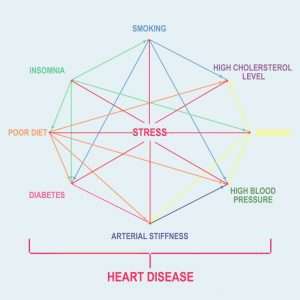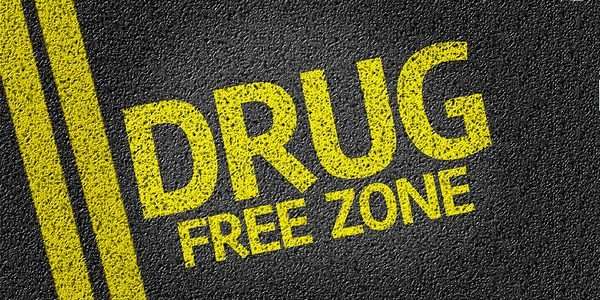 We all want the amazing organ which keeps our blood circulating 24/7 to work well for decades to come. One of the most effective ways to prevent wear and tear on our heart is to reduce stress. When we look at major risk factors for heart disease, it turns out that stress is both a direct and indirect culprit.
We all want the amazing organ which keeps our blood circulating 24/7 to work well for decades to come. One of the most effective ways to prevent wear and tear on our heart is to reduce stress. When we look at major risk factors for heart disease, it turns out that stress is both a direct and indirect culprit.
Here are some facts to inspire you to learn how to unwind in order to keep your heart healthy and happy.
Food choices
Studies show that under stress you tend to make bad food choices. The stress-induced craving for sugary, salty and fatty foods in turn contributes to weight gain, stiffening of arteries and an increase in cholesterol level and insulin resistance – all of which are major risk factors for heart disease.
So, doctor’s orders are to stop relieving your blues with chips and chocolate! Instead, “self-medicate” with exercise and meditation (read more).
Smoking and drinking
Tobacco and alcohol are directly linked to poor outcomes for heart health, but these bad habits additionally cause harm by increasing blood pressure, cholesterol level and insulin resistance. Since you’re more likely to turn to tobacco and alcohol when feeling distressed, it’s best to get to the root of the problem and manage your stress response.
Studies show that by engaging in the practice of Transcendental Meditation, which provides relaxation and stress relief, a person might quite unintentionally beat cigarette and alcohol addiction as well (read more).
[elementor-template id=”41970″]
Insomnia
After you’ve had a busy and stressful day at work, Mr. Sandman often forgets to check in during the evening. And when stress keeps you awake at night, then it endangers not only the people who cross your path the next morning but also your cardiovascular system.
There is a proven correlation between insomnia and poor heart health, in part because lack of sleep contributes to heart disease risk factors such as unhealthy eating and development of diabetes.
When you turn to stress relief methods like Transcendental Meditation that help you sleep like a baby, both you and your heart can wake up happy and rested (read more).

Blood pressure, cholesterol level, insulin resistance, and arterial stiffness
Stress harms your heart not only by driving you to harmful habits and cutting short your snooze time. Feeling distressed also contributes to increased levels of cholesterol, insulin resistance, arterial stiffness and blood pressure.
This is obviously bad news for your heart. Damage resulting from these changes and plaque buildup on arterial walls can lead to a situation where the ‘pump of life’ cannot efficiently receive and/or deliver blood. Whether the ultimate outcome is congestive heart attack, congestive heart failure, coronary artery disease or cardiomyopathy, it is best to avoid these diagnoses on your medical record altogether (read more).
The proven power of stress reduction
A good example of a technique which gives downtime to body and mind and simultaneously tackles various risk factors threatening your heart is the Transcendental Meditation technique.
 Scientific studies show that practicing Transcendental Meditation for 20 minutes twice a day helps to improve heart health all around – reducing blood pressure; relieving exercise-induced myocardial ischemia, atherosclerosis and left ventricular hypertrophy; lowering insulin resistance; improving cardiac autonomic nervous system tone and the quality of life and functional capacity of patients who already suffer from congestive heart failure; helping to beat insomnia and also alcohol and drug addiction; and perhaps even helping with weight loss. Many of these benefits probably stem from the technique’s proven power to bust stress.
Scientific studies show that practicing Transcendental Meditation for 20 minutes twice a day helps to improve heart health all around – reducing blood pressure; relieving exercise-induced myocardial ischemia, atherosclerosis and left ventricular hypertrophy; lowering insulin resistance; improving cardiac autonomic nervous system tone and the quality of life and functional capacity of patients who already suffer from congestive heart failure; helping to beat insomnia and also alcohol and drug addiction; and perhaps even helping with weight loss. Many of these benefits probably stem from the technique’s proven power to bust stress.
Do not spare any effort in disentangling yourself from the web of stress and heart disease. Reducing stress will go a long way toward keeping your heart in top-notch shape!
Academic references:
- Food selection changes under stress. 2006. Physiology & Behavior, 87(4).
- Psychological Stress is Associated with Increases in Weight and Waist Circumference over Time: Longitudinal Data from the Dallas Heart Study. 2014. Circulation, 129.
- Obesity and Heart Disease. A Statement for Healthcare Professionals From the Nutrition Committee, American Heart Association. 1997. Circulation, 96.
- Adolescents becoming smokers: the roles of stress and coping methods. 2000. Journal of Adolescent Health, 27(6).
- Insulin resistance and cigarette smoking. 1992. The Lancet, 339(9902).
- The relationship between smoking, cholesterol, and HDL-C levels in adult women. 1995. Women Health, 23(4).
- Persistent blood pressure increase induced by heavy smoking. 1992. Journal of Hypertension, 5.
- The association between stress and drinking: modifying effects of gender and vulnerability. 1999. Alcohol and Alcoholism, 40(5).
- Alcohol and high-density lipoprotein cholesterol: causal inference from diverse study designs. 1981. Circulation, 64.
- Stress, Personality and Serum-Cholesterol Level. 1982. Journal of Human Stress, 8(4).
- Is Relationship Between Serum Cholesterol and Risk of Premature Death From Coronary Heart Disease Continuous and Graded? Findings in 356 222 Primary Screenees of the Multiple Risk Factor Intervention Trial (MRFIT) 1986. JAMA, 256(20).
- Perceived psychological stress in diabetes mellitus type 2. 2000. Rev Invest Clin, 52(3).
- Stress Provokes Endothelial Dysfunction and Insulin Resistance Partly Through Activation of NF-kB and Inhibition of Insulin Signaling Pathway to NO Production by Corticotropin-releasing Hormone. 2013. Circulation, 128.
- Mortality from Coronary Heart Disease in Subjects with Type 2 Diabetes and in Nondiabetic Subjects with and without Prior Myocardial Infarction. 1998. New England Journal of Medicine, 339.
- Hypertension. World Heart Federation.
- Depressive Symptoms Are Associated with Worsening of Arterial Stiffness With Mental Stress. 2014. Circulation, 129.
- Mechanisms, Pathophysiology, and Therapy of Arterial Stiffness. 2005. Arterioscler Thromb Vasc Biol, 25(5).
- Arterial stiffness, systolic blood pressure, and logical treatment of arterial hypertension. 1990. Hypertension, 15.
- Diabetes and Arterial Stiffness. 2001. Contemporary Cardiology.
- Does work stress predict insomnia? A prospective study. 2004. British Journal of Health Psychology, 9(2)
- Insomnia and heart disease: A review of epidemiologic studies. 1999. Journal of Psychosomatic Research, 47(4)
- Insomnia With Objective Short Sleep Duration Is Associated With Type 2 Diabetes. 2009. Diabetes Care, 32(11).
- Bidirectional associations between insomnia symptoms and unhealthy behaviours. 2013. J. Sleep Res, 22(1).

















